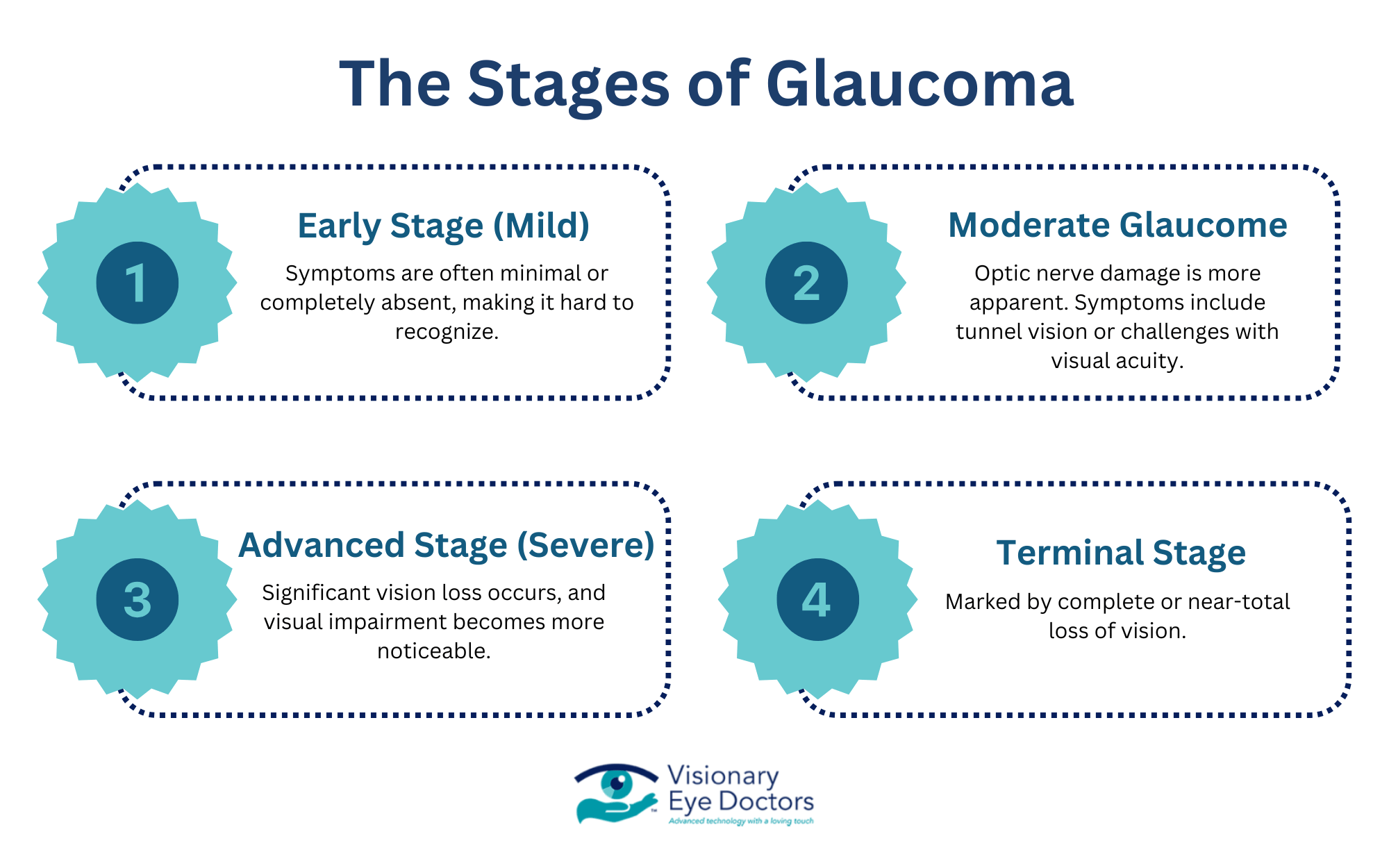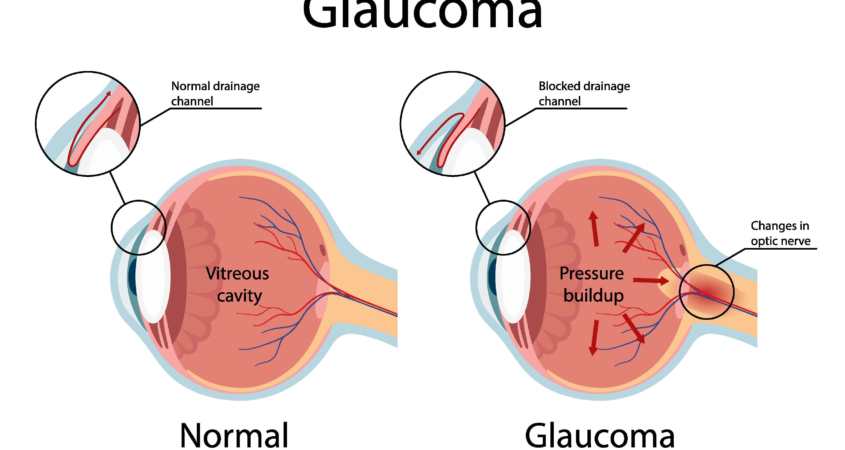What are the Stages of Glaucoma?
Glaucoma progresses gradually, starting with mild vision changes in its early stages and advancing to significant vision loss and potential blindness if left untreated. Early detection and treatment are crucial to slowing its progression and preserving vision.
Understanding Glaucoma and Its Impact on Vision Quality
Glaucoma is an eye disease that gradually damages the optic nerve – a critical component in transmitting visual information from your eyes to your brain. This damage is often linked to increased intraocular pressure (IOP), which occurs when the fluid in your eye doesn’t drain properly – creating pressure that harms the optic nerve.
There are two main types of glaucoma:
- Open-Angle Glaucoma: The most common type characterized by a gradual buildup of pressure without noticeable symptoms in the early stages.
- Angle-Closure Glaucoma: Happens when the drainage angle in the eye becomes blocked, causing an increase in eye pressure and requiring immediate medical attention.
Other types include secondary glaucoma and congenital glaucoma. Secondary glaucoma results from an underlying condition, such as an eye injury or inflammation. Congenital glaucoma is a rare form present at birth, caused by developmental issues in the eye’s drainage system.
Why is Glaucoma a Concern?
In the United States, glaucoma is a leading cause of irreversible blindness and affects millions of people. Most people don’t notice symptoms until significant vision problems occur. As the disease progresses, blind spots develop in the peripheral vision, eventually leading to severe impairment if untreated.
This irreversible nature of optic nerve damage makes glaucoma a serious concern that requires proactive management.
The Importance of Early Detection
Early detection is vital to managing glaucoma effectively. Risk factors include:
- Advanced age
- Family history of glaucoma
- Increased prevalence among African Americans, Hispanic, and Asian populations
Diagnostic tools such as optical coherence tomography (OCT) and retinal nerve fiber layer analysis allow eye care professionals to detect changes in the optic nerve and monitor disease progression.
Regular eye exams are also crucial, especially for individuals at a higher risk, to catch glaucoma in its earliest, most manageable stages.

Breaking Down the Different Stages of Glaucoma
Early Stage (Mild Glaucoma)
In the early stage of glaucoma, symptoms are often minimal or completely absent, making it difficult for people to recognize any changes. Peripheral vision may begin to show subtle changes, and eye pressure might be elevated.
Although damage to the eye may be slight, these early changes are detectable through comprehensive eye exams. Regular monitoring is essential to identify glaucoma in this stage and initiate timely treatment.
Moderate Glaucoma
As glaucoma progresses to the moderate stage, optic nerve damage becomes more apparent – leading to noticeable visual field changes. Symptoms can include tunnel vision – where peripheral vision narrows – or challenges with visual acuity.
At this stage, the disease is more advanced but still manageable with appropriate treatments to slow further damage and preserve remaining vision quality.
Advanced Stage (Severe Glaucoma)
In advanced glaucoma, significant vision loss occurs, and visual impairment becomes more noticeable. Damage to the optic nerve is extensive, and symptoms often include a severe narrowing of the visual field and difficulty with daily activities that require clear sight.
The risk of acute glaucoma increases, making treatment crucial to prevent rapid deterioration.
Terminal Stage (End-Stage Glaucoma)
The terminal stage of glaucoma is marked by complete or near-total loss of vision. By this point, optic nerve damage is irreversible, and the structural integrity of the eye is compromised.
While treatment options at this stage focus on comfort and quality of life, the goal is to preserve any remaining vision and minimize further complications.
Managing and Treating Glaucoma at Every Stage
Early Stages
- Regular Eye Exams: Early detection is essential for managing glaucoma before it progresses. Comprehensive eye exams and screening can help catch the disease early on.
- Lifestyle Adjustments: Adopting a healthy lifestyle can also improve overall eye health – such as regular exercise, maintaining a balanced diet, and avoiding smoking. You can also reduce eye pressure through stress management and avoiding activities that strain the eyes.
Moderate Stages
- Medical Treatments
- Eye Drops: Often the first line of defense, designed to lower intraocular pressure.
- Laser Therapy: Procedures like Selective Laser Trabeculoplasty (SLT) can enhance fluid drainage in the eye, helping to lower IOP.
The goal of these glaucoma treatments is to preserve remaining vision and slow the progression of optic nerve damage.
Advanced Stages
- Micro-Invasive Glaucoma Surgery (MIGS): A minimally invasive surgical technique that reduces IOP. It’s becoming widely accepted as one of the most successful surgeries for treating mild-to-moderate glaucoma.
The Role of Technology in Diagnosis and Treatment
- Advanced Diagnostic Tools: We utilize cutting-edge equipment, such as Optical Coherence Tomography (OCT), to detect and monitor glaucoma progression accurately.
Working with a glaucoma specialist ensures that patients receive the best care tailored to their specific needs. By addressing glaucoma at each stage with personalized treatment plans, we aim to preserve our patients’ vision and enhance their quality of life.

Why Choose Visionary Eye Doctors for Glaucoma Care?
At Visionary Eye Doctors in Washington, DC and Maryland, we prioritize your eye health and overall well-being. We combine our medical expertise with a compassionate, personalized approach. Every treatment plan is tailored to meet your unique needs and lifestyle goals, ensuring you receive the best possible care.
Comprehensive Treatment Options for Every Stage of Glaucoma
From prescription eye drops and laser therapy to minimally invasive surgical techniques like MIGS, we offer a wide range of advanced treatments to meet the needs of glaucoma patients at every stage. Our team also provides ongoing support to help manage the condition and protect your vision.
Commitment to Long-Term Eye Health
Our ultimate goal is to ensure proactive care that prevents damage and supports your vision long-term. With a focus on early intervention and personalized treatment, we help you maintain your eye health and quality of life for years to come.
Schedule an Appointment Today
Your vision deserves expert care, so take the next step and schedule a comprehensive eye exam or consultation at Visionary Eye Doctors today.
Early detection is essential to protecting your sight – don’t wait to take charge of your eye health.
Resources:
- CDC: Vision and Eye Health. https://www.cdc.gov/vision-health/
- Cleveland Clinic. https://my.clevelandclinic.org/
- Glaucoma Research Foundation. https://glaucoma.org/



